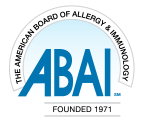Notes From the Chair
by Calman Prussin, M.D.

MOC: Keeping it Real
It is both an honor and a huge responsibility to serve as the 2015 chair of the ABAI Board of Directors. The board has two major responsibilities, to formulate and implement the Board Certification and Maintenance of Certification (MOC) programs and to administer policy regarding ABAI certification. The number and complexity of issues affecting the practice of Allergy & Immunology has increased, which is similarly reflected in the increased workload of the ABAI, including MOC. Recently, MOC programs have been the subject of much discussion. As such, my words will focus on the ABAI MOC program.
The ABAI is one of 24 member boards of the American Board of Medical Specialties (ABMS). In 2000, the ABMS member boards agreed that each board would develop an MOC program for their specific specialty's needs. The initial ABAI MOC rollout has generally received a positive reception, with some notable exceptions. To continue to improve MOC, last August the ABAI performed a SurveyMonkey® poll of all ABAI diplomates regarding MOC. Key criticisms included the overload of various MOC requirements and modules, the testing of factoids rather than clinical judgment in the secure exam, and cost. We on the ABAI Board of Directors are your colleagues; our role is to advocate for A&I diplomates to address the above concerns.
MOC 2.0
These past few years represent the first iteration of MOC. ABAI MOC is evolving and improving. We are looking to other boards and in some cases adopting their practices, as best fits A&I. A major goal of the ABAI is to further develop processes to minimize the amount of busy work required for MOC. As of this month, the ABAI Web Portal automatically captures CME from the AAAAI, ACAAI, CIS, and Georgia Regents University along with any RSL using either of these organizations for CME. These changes along with others detailed in Steve Wasserman’s President’s Message will dramatically reduce the busy work required of diplomates. Similarly, we are looking to increase the use of local Quality Improvement programs that are required in many practice situations, and co-purpose them for Part IV MOC credit.
The number of different MOC modules adds flexibility and choice, and allows some diplomates to use the same MOC module for both A&I and their parent boards. However, many diplomates also find the sheer number of choices overwhelming. Nick Van Kuren, the ABAI Manager of Technology is working to develop a new website layout with a simpler view of MOC choices. If you do have any questions about MOC do not hesitate to call the ABAI office. The ABAI staff has an expertise with MOC issues and is incredibly responsive to diplomate questions.
MOC must reflect diplomates’ practice of Allergy & Immunology. To that end we are constantly seeking to refine our current MOC modules and identify new modules that are relevant and valuable.
Looking Forward
We live in a fast-paced world filled with ever-present change and disruptive technology, all of which can leave one feeling off-balance. MOC is one of those changes. Such turmoil is also an opportunity to strengthen the practice of A&I and improve the delivery of medical care to our patients. The ABAI Board of Directors welcomes your feedback on how we can continue to develop MOC to advance the practice of Allergy and Immunology.
